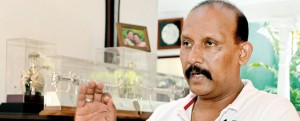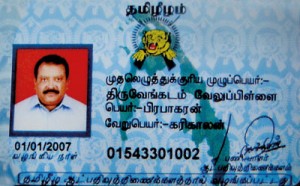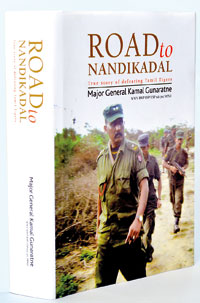Sunday Times 2
Be on your guard, there could be LTTE sleeper cells: Major Gen. Kamal Gunaratne
View(s):My book is for the families of the poor soldiers who authored the final victory
By Chandani Kirinde
Umpteen stories are written on how wars are fought and won and this is true of Sri Lanka, too, where since the defeat of the LTTE in May 2009, countless books have been authored giving different perspectives of how the Sri Lanka Army (SLA) defeated the Tamil Tigers.

Major General Kamal Gunaratne: " I am not a hardliner but we have to learn lessons from the past" Right: Prabhakaran's 'Tamileelam' identity card. Major Gen. Gunaratne says he will hand it over to the Army museum
The most recent publication titled ‘Road to Nandikadal’, authored by Major General Kamal Gunaratne whose entire career in the Sri Lanka Army spanned the three decades of the separatist war in the North and East of the country, seeks to tell the story from the perspective of a battle hardened soldier.
He chose to launch the book earlier this month, a day after he hung up his uniform for the last time — 35 years and six days from the first day he donned military fatigues. It has been an exhaustive exercise for the newly retired Major General, four years of writing in long hand in Sinhala, not wanting a ghost writer to author the book for him. “I have written the book from my heart. It’s 100 percent honest and based on my first hand experiences of more than three decades in the army,” he said.
Through his book, Major General Gunaratne tells the reader the story of what inspired him to join the Army, his frustrations at times working within a system where hierarchical politics sometimes got in the way of sound decisions in the best interests of the country, the camaraderie of soldiers who fearlessly went forward in the final battle against the LTTE knowing they were facing certain death or serious injuries, his feelings of euphoria on seeing the lifeless body of the LTTE leader Velupillai Prabhakaran lying at his feet and still has a word of praise for the dreaded terrorist leader for his unfettered commitment to his cause.
The flush of military victory has receded over the years but the release of his book has once again opened up new discussion on whether such a publication is a precursor to a possible career in politics. “I am a well experienced and very successful military commander who reached the pinnacle of my career. If I enter politics, I will be an infant in the field. Hence you will never hear the name Kamal Gunaratna in politics,” he says firmly.
 The rumors of his possible entry to politics, he says, were sparked by the presence of former President Mahinda Rajapaksa and Former Defence Secretary Gotabaya Rajapaksa at the launch of his book earlier this month. “I have the highest respect for President Rajapaksa for his unwavering support to the military when he was under tremendous pressure from the international community to stop military action. As for Gotabaya Rajapaksa, he was my Officer Commanding when I joined the Army and I learnt a lot under him. This is why they were among the five persons I personally chose to invite for the event. But this does not mean I will align with them in politics,” he says.
The rumors of his possible entry to politics, he says, were sparked by the presence of former President Mahinda Rajapaksa and Former Defence Secretary Gotabaya Rajapaksa at the launch of his book earlier this month. “I have the highest respect for President Rajapaksa for his unwavering support to the military when he was under tremendous pressure from the international community to stop military action. As for Gotabaya Rajapaksa, he was my Officer Commanding when I joined the Army and I learnt a lot under him. This is why they were among the five persons I personally chose to invite for the event. But this does not mean I will align with them in politics,” he says.
Two other special invitees to the book launch were the widows of two much decorated senior military officers, Major General Vijaya Wimalaratne and Lieutenant General Denzil Kobbekaduwa. They died in action in 1992.“If not for these two generals there would be no road to Nandikadal. They are the two most respected generals who ever served in the SLA.”
A notable absentee on the occasion was former Army Commander and now Field Marshal Sarath Fonseka. Asked why his former Commander was left out of the invitee list, Major General Gunaratne says it was to avoid an “embarrassing situation.”
“Now he is a politician and they have their own problems and I did not make it an embarrassing situation for anyone. I have given due respect and due recognition to General Fonseka in my book and I still respect my Commander General Sarath Fonseka, not Field Marshal or politician Fonseka,” he says.
Questions of political affiliations aside, Major General Gunaratne is uneasy about recent developments like the attacks on the Kandyan dancers at the Jaffna University and the attack on our High Commissioner in Malaysia. “I am not a hardliner but we have to learn lessons from the past,” he says.
And in this situation, he does not mind being called an alarmist and warns it is too early to downsize the army or withdraw the military form the north and east even if the LTTE is militarily defected. “The army must remain as it is for the next five years,” he says. To justify his argument, Major General Gunaratne points to the presence of more than 12,000 rehabilitated ex-LTTE cadres in the north and east. Among these, he says were around 500 suicide cadres and the lack of a mechanism to monitor their level of integration, means there is a threat of them regrouping. “If the proper leadership emerges to give them motivation and moral courage, there could be a few hundred ready to take up arms again. Some sections of the Diaspora too have not given up their dream for a separate state and are active in pursuing different means to revive separatism,” he cautions.
 “I am an alarmist due to valid reasons,” he says.
“I am an alarmist due to valid reasons,” he says.
Major General Gunaratne is assured a place in the history which records the decisive final battle against the LTTE. This is because he headed the 53 Division whose men killed Prabhakaran and wiped out almost the entirety of the top leadership of the Tamil Tigers.
While he talks openly about his jubilation and that of the soldiers around him on that fateful day on seeing the LTTE leader’s body, he says it’s a matter that must be left at that. “Prabhakaran s body was cremated. We’ll leave it at that,” he says when asked for more details of what happened after the famous scenes were flashed across the nation over television showing the LTTE leader’s body lying on the ground surrounded by hundreds of soldiers. A memento he is taken from the scene, the Identity Card of Prabhakaran remains with him, which in due course he hopes to hand over to the army museum.
“I wrote this book mainly for the families of the poor soldiers who came forward to defend the country. I want their loved ones to read it and understand the bravery of these soldiers. I did not want to antagonise anyone. I just want to get everyone into the picture about what transpired on the battle front,” he says.

